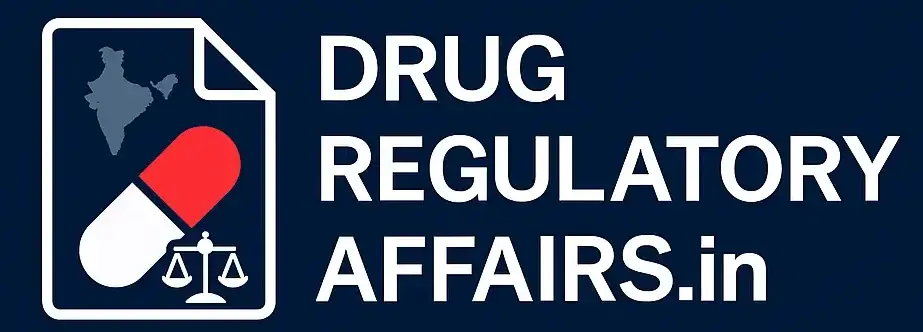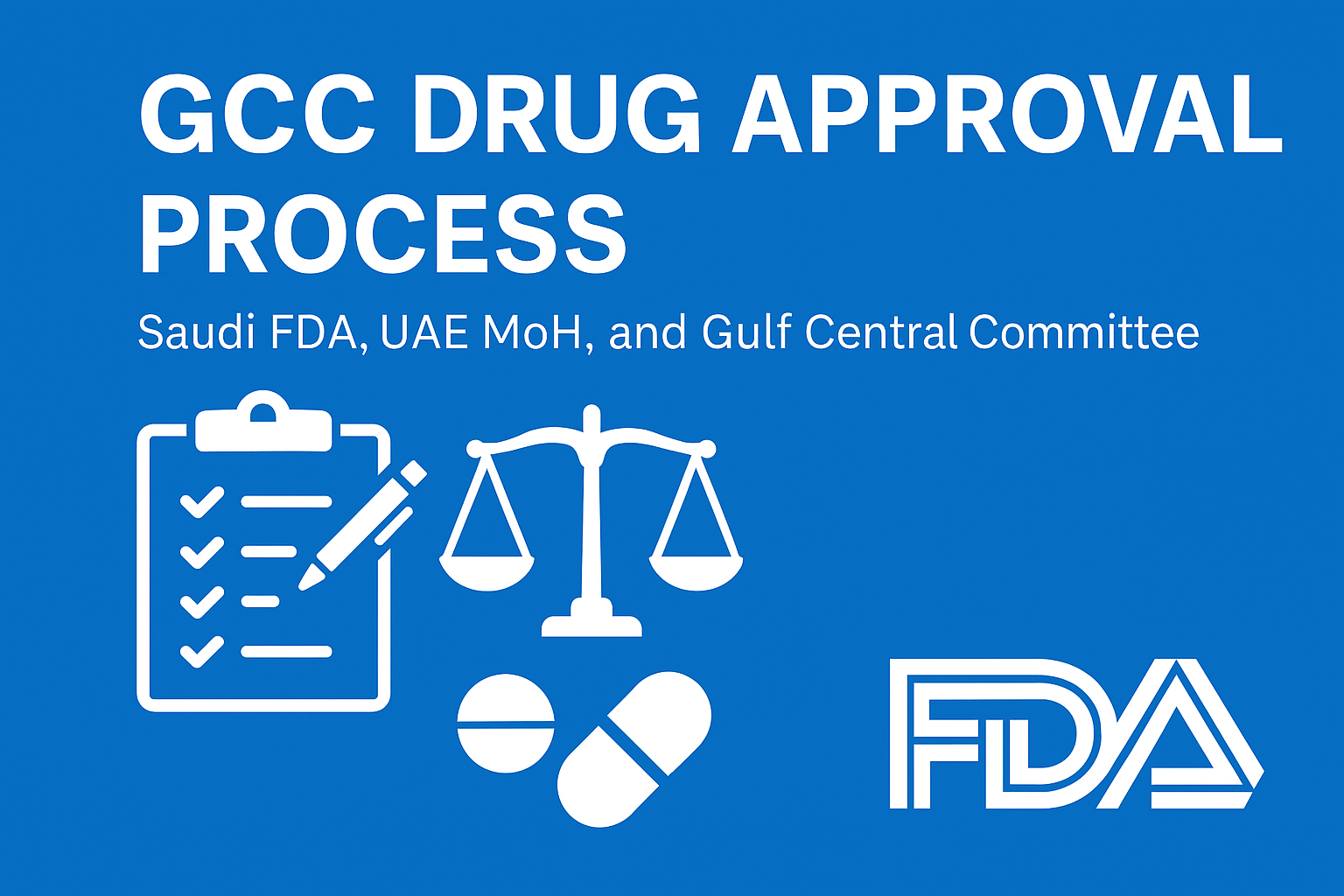GCC Drug Approval Process – Saudi FDA, UAE MoH, and Gulf Central Committee Explained
GCC Drug Approval Process: The Gulf Cooperation Council (GCC) is a political and economic alliance of six Middle Eastern countries: Saudi Arabia, United Arab Emirates (UAE), Kuwait, Oman, Qatar, and Bahrain.
While each country operates its own national regulatory system for drug approvals, there exists a centralized drug registration system under the GCC Health Council that aims to harmonize pharmaceutical regulations across member states.
Read More: MHRA Drug Approval Process – How to Register a Drug in the UK (Step-by-Step Guide)
In this comprehensive guide – GCC Drug Approval Process, we will explore the GCC Drug Approval Process, including the Saudi FDA (SFDA), UAE Ministry of Health (MoH), and the GCC Central Registration Procedure, along with timelines, document requirements, fees, and post-approval obligations.
🌍 What is the GCC Central Drug Registration?
The GCC-DR system is a centralized pathway for registering pharmaceutical products across all GCC member states through the GCC Health Council based in Riyadh.
It simplifies the process by allowing a single application and review process for product approval in multiple countries.
💡 Note: While GCC-DR is the recommended route for efficiency, it is not mandatory. Manufacturers may still pursue national registration with individual authorities such as the Saudi FDA (SFDA) or UAE MoHAP.
Must Read: CDSCO Drug Approval Process – How to Register a Drug in India (Step-by-Step Guide)
🏥 GCC Member Regulatory Authorities
| Country | National Authority |
|---|---|
| Saudi Arabia | Saudi Food and Drug Authority (SFDA) |
| United Arab Emirates | Ministry of Health and Prevention (MoHAP) |
| Qatar | Ministry of Public Health (MOPH) |
| Kuwait | Ministry of Health – Drug Regulatory Authority |
| Oman | Directorate General of Pharmaceutical Affairs & Drug Control (DGPA&DC) |
| Bahrain | National Health Regulatory Authority (NHRA) |
🛤️ Routes for Drug Registration in GCC Drug Approval Process
1. Centralized Registration via GCC-DR (Gulf Central Committee for Drug Registration)
- Submission made to the GCC Health Council (Riyadh)
- Scientific review by the Saudi FDA
- After approval, registration applies to all GCC states
- Requires local agent in each country for product release and importation
2. National (Decentralized) Registration
- Separate applications to each country’s authority
- Used for faster market access or country-specific requirements
- Common when centralized process is slow or has backlog
📋 Documents Required for GCC Drug Approval Process
All GCC countries follow the CTD (Common Technical Document) format.
Major documents include:
Module 1 – Regional Information
- Cover letter
- Application form
- GMP certificate
- Certificate of Pharmaceutical Product (CPP)
- Pricing certificate
- Labelling and artwork
- Samples (if requested)
Module 2 – Overviews & Summaries
- Nonclinical and clinical summaries
- Quality summaries
Module 3 – Quality
- Manufacturing processes, specifications, validations
Module 4 – Nonclinical Study Reports
Module 5 – Clinical Study Reports
📌 eCTD is becoming more common but not mandatory in all countries yet.
🇸🇦 Saudi FDA (SFDA) Drug Approval Process
The SFDA is the most advanced and strict regulatory body in the GCC and plays a key role in centralized review.
Step-by-Step SFDA Registration Process:
- Account Creation on SFDA’s online platform (SDI or DRA portal)
- Dossier Submission in CTD format
- Payment of Fees (~SAR 80,000+ for new molecules)
- Scientific Review (Quality, Clinical, Nonclinical)
- Site Inspection / GMP Compliance Check
- Approval & Market Authorization
🔄 SFDA timelines range from 9 to 12 months depending on product complexity.
🇦🇪 UAE Ministry of Health (MoHAP) Drug Approval
The UAE has a streamlined national system for pharmaceutical product registration through MoHAP.
Requirements:
- Local UAE-based authorized agent
- Submission of CTD dossier (English + Arabic)
- Original documents legalized by UAE embassy
- Local laboratory testing for generics
Timeline:
Average 6–8 months from submission to approval, subject to completeness of documents.
💸 GCC Drug Approval Process Timelines & Fees
| Country | Avg. Timeline | Fee (Estimate in USD) |
|---|---|---|
| GCC-DR (central) | 12–18 months | $20,000+ |
| Saudi FDA | 9–12 months | $25,000–$50,000 |
| UAE | 6–8 months | $10,000–$20,000 |
| Oman | 8–10 months | $8,000–$15,000 |
| Kuwait | 6–9 months | $6,000–$10,000 |
| Qatar | 6–9 months | $7,000–$12,000 |
| Bahrain | 6–10 months | $5,000–$10,000 |
🧪 Clinical Trials & Bioequivalence in GCC
- Bioequivalence (BE) studies are mandatory for generic products.
- SFDA and UAE require local testing or study waiver based on reference data.
- Clinical trials are rarely conducted in the GCC, but approvals are possible via separate pathways.
📦 Post-Approval Requirements
- Batch release approvals (especially in Saudi and UAE)
- Pharmacovigilance reporting (local QPPV and PV system mandatory)
- Label updates and safety variations
- Renewal of MA every 5 years
- Product recalls and complaints management
📈 Challenges in GCC Drug Approval Process
- Language barrier (Arabic documentation often required)
- Differences in regulatory expectations among member states
- Limited centralization despite GCC-DR framework
- Changing requirements and evolving digital systems
🌐 GCC vs EMA vs USFDA – Comparative Table
| Criteria | GCC | EMA | USFDA |
|---|---|---|---|
| Centralized System | Partial (GCC-DR) | Yes | No |
| eCTD | Some countries | Yes | Yes |
| Local Agent Required | Yes | No | Yes (for foreign companies) |
| Timelines | 6–18 months | ~210 days | ~10 months |
| Language | English + Arabic | English | English |
🧠 Tips for Successful Registration
- Always hire a competent local agent/distributor
- Keep Arabic translations ready in parallel
- Use common modules across GCC to reduce redundancy
- Plan for site audits and GMP inspections
- Be patient with GCC-DR; start national registration in parallel if urgent
❓ FAQs – GCC Drug Approval Process
Q1. Is GCC central registration mandatory?
No, it’s optional. You can register directly with each GCC country.
Q2. How long does centralized registration take?
12–18 months typically, sometimes more.
Q3. Can I use the same CTD for all countries?
Yes, with minor modifications in Module 1.
Q4. Are generics approved faster?
Yes, especially if BE data is available.
Q5. What happens post-approval?
You must manage pharmacovigilance, renewals, and safety updates.
✅ Conclusion: GCC Drug Approval Process
Understanding the GCC Drug Approval Process is essential for pharmaceutical companies looking to access the Gulf market.
While the GCC-DR offers a centralized route, national registrations in Saudi Arabia and UAE are often quicker and strategically preferred.
By preparing a strong CTD dossier, working with experienced local partners, and staying updated with changing guidelines, companies can ensure faster approval and successful commercialization.

